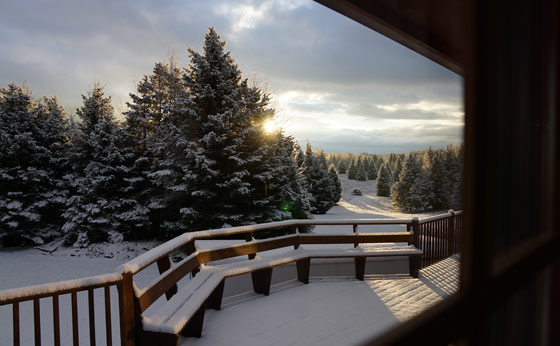Preparing For A Bad Winter

The winter scene from my home-office window this morning
Will we have a bad winter this season? Maybe, for some, but we should all be preparing for winter each and every year. The time to prepare is now – before you’re buried in snow or shivering in the cold.
Here are a few ideas:
At or near the top of the list during winter is HEAT. Whatever fuel you use for winter heat, top it off. Always budget for using more than you expect.
If you haven’t had your furnace serviced in awhile, better to do it now rather than being caught without heat during an equipment failure in the middle of winter.
Have a wood stove? Clean the chimney/ flue to avoid a house fire.
EXPECT to experience a power failure during the winter and prepare for what you will do to stay warm during the outage. Almost every method of home heating requires electricity to operate all or part of the system. A portable indoor heater is one option. Having multiple sources of heat is even better. Get yourself a winter rated sleeping bag!
If you don’t already have one, consider getting a generator. A generator can be professionally (permanently) installed and integrated into your home’s electrical system, OR you can simply run a heavy duty extension cord from the generator into your home to power up a few things – even an electric heater depending on your generators output. There are lots of options here, but it’s worth considering.
If you do have a generator, then go outside and check it. Check the oil level (some generators will NOT automatically shut down when the oil runs out and it will destroy the generator). Then start it up. Make sure it runs okay. Some generators have a start-up battery and it’s wise to run it every so often to keep it charged. Use fuel stabilizer treatment for longevity of the gas.
Check your winter clothes (all aspects). If you’re without power at home during the winter, you will be glad to be wearing thermals under your clothes, insulated socks, etc.
If you have well water, your well pump will not work without electricity. Either have a generator, or be sure to store ahead some water. You might consider keeping a water-filled 55-gallon barrel in your basement. Or if that is not an option, then at least store ahead quantities of water using other means, like soda-pop jugs or other water containers.
It should go without saying, but have AT LEAST several week’s worth of food for backup. Many people do, but many people don’t! Don’t be part of the crazed sheeple panic just prior to the onset of a storm as they rush to the grocery store for bread and milk.
Carbon Monoxide is winter’s silent killer. Be sure that you have at least one!
Have a camp stove for cooking without electricity. Be aware of the potential dangers while operating indoors. NEVER operate a BBQ grill indoors. Some small portable stoves are designed to be perfectly safe inside. Just check your model so that you know.
Check your supply of shovels. Consider keeping various styles — some meant for pushing the snow, some for scooping, small ones, large ones, the kind with a bent handle which makes it easier on the back, etc… ALWAYS keep a shovel in your vehicle. They make some nice small-medium shovels (some with collapsible handles) which could help dig you out of a snowbank.
Your snow-blower or snow-thrower. Start it up and run it NOW, before the winter sets in. Make sure it runs okay. You might need a new spark plug. Get FRESH gasoline. Don’t use old gas that has not been treated. If your engine requires a mix of oil-gas, then be sure you have the oil and mix up a fresh batch.
Salt for melting ice on stairs, driveways, etc. If you use a-lot of it, you might consider getting a barrel to keep it in along with a handy small shovel or scoop to apply it.
Replace your wiper blades now. You will thank yourself later.
Get a jug of windshield washer fluid, and be sure it is the kind that will not freeze (there are many varieties that WILL indeed freeze – so check the label).
It’s time to put the ice scraper and snow brush back in the car.
Consider keeping a bag of sand-salt or kitty litter in the trunk. It’s more manageable in a clean, dry jug (laundry detergent bottle, gallon water or milk jug, etc..) which keeps it dry, won’t break open (like a paper bag) and easy to control how much you spread.
Tire chains. Some areas of travel may require chains. If you get a set of chains, be sure to practice installing them once in your driveway when the weather is nice BEFORE you ever need them in an emergency on the road.
Check your tires. Is the tread wearing thin? Traction is important during the winter.
Keep a 72-hour survival kit in the car.
Keep a dedicated hat and gloves in the car, and a warm blanket for each person.
A cell phone charger for the car.
I hope that this list will inspire you to consider your own winter preparedness.
Add a comment with your own ideas, suggestions or experiences…
